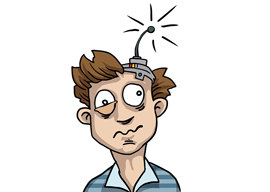
October 30, 2014

Source: Shutterstock
Some boffins at Harvard University claim to have transmitted information from one person’s mind to another by telepathy. Reading through the paper, I thought the content transmitted wasn”t very impressive”just the Spanish and Italian words for “hello””but hey, baby steps.
Is telepathy a thing we should hope for? I have mixed feelings, based on long acquaintance with the notion from an adolescence spent reading science fiction.
Telepathy was one of the staple themes in sci-fi of the Golden Age. This isn”t much remembered now because telepathy is hard to dramatize on movie or TV screens, which is where the last couple of generations have gotten most of their sci-fi from. Moviecus list “65 movies about telepathy,” but scanning through them, it seems that telepathy is a secondary plot device, not the main theme.
The printed page does better. There have been some fine telepath novels. In many, like John Wyndham’s The Chrysalids or A.E. van Vogt’s Slan, telepaths are a feared and hated minority. Occasionally, as in Alfred Bester’s The Demolished Man, they are a majority, persecuting non-telepaths. Most often they are just rare freaks who understand how very unpopular they”d be if their ability was discovered, and so they keep it secret.
The best telepath stories”Theodore Sturgeon’s More Than Human comes to mind”are of that last variety. They cater to the common human fantasy of seeing oneself as special, possessed of extraordinary powers un-guessed at by the dumb majority: Superman, Harry Potter, etc.
There have been good thriller novels on that theme. One of the best was Eric Frank Russell’s Three to Conquer. After some childhood traumas, the solitary telepath learns to hide his gift, until one day he encounters a normal-looking woman whose mind, he perceives when probing it, has been taken over by an alien life-form. With all humanity at stake, he decides to offer his talents to the FBI. There is a hilarious interview in which he tries to persuade a G-man that he can read minds.
He smiled at Pritchard and enquired, “How’s your body?”
“Eh?”
Out of the other’s bafflement Harper extracted a clear and detailed picture of the body. He said in helpful tones, “You have a fish-shaped birthmark on the inside of your left thigh.”
Actual telepaths, if there are any, must surely be misanthropes. Most of our thoughts are garbage, or worse.
After reading that story about the Harvard researchers I went and walked my dog, monitoring my own thoughts as I walked. Here they are, categorised:
Earworms. I spend a lot of time playing tunes in my head. Today it was that silly doctor song from The Millionairess, ignited I suppose by my having recently read something in the papers about Sophia Loren.
Body issues. We all (I hope) have niggling persistent worries about our bodies. With me lately it’s been nose hairs. Mine are going through some kind of sensational growth spurt. I catch myself in the mirror and see this long bright-gold hair curling down out of a nostril, like a walrus tusk. It wasn”t there yesterday. What’s going on here?
Staircase wit. What I should have said to the guy who unhorsed me last night in a verbal joust. Shoulda, coulda, woulda.
Fantasies. The less said, the better. A friend once confided to Dr. Johnson that he was troubled with “shocking impious thoughts.” Replied the great moralist: “If I was to divide my life into three parts, two of them have been filled with such thoughts.”